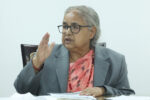Social security as a non-traditional security concept is considered as one of the fundamental criteria of today’s modern world.
In our human society, some contingencies, seen or unseen are however found common and people have from time to time attempted to find out proper countermeasures against those.
Social security as one of these countermeasures that act as a major weapon to face the challenges and threats in society.
Government and its local unit have the major responsibilities to ensure social security in the rural area of the country.
The local unit of the central or federal government shoulders the various functions to resolve the existing contingencies by providing social assistance and social service.
As the coronavirus spreads aggressively across South Asian countries, social insecurity is just one of the many challenges facing the poorest and the most vulnerable in the region.
The evolving crisis has been characterized by politicians, scholars, and media organizations as the most perilous threat to human progress, peace, prosperity and stability since the Second World War.
Most work in the informal sector, which does not provide any social insurance benefits. Many do not have any savings to tap into during rough times.
Missing even one day of work can lead to extreme coping strategies like skipping meals, cutting down on medical care, or selling assets.
COVID-19 has posed a serious threat towards the existence of human beings on an unprecedented scale with ruthless and remorseless efficiency.
Virtually all countries have been deployed possible best efforts to try and halt the spread of the pandemic at an enormous social and economic cost.
The evolving crisis has been characterized by politicians, scholars, and media organizations as the most perilous threat to human progress, peace, prosperity and stability since the Second World War.
South Asia with its population of about 1.5 billion is one of the regions in the world highly exposed to a variety of natural as well as human-induced hazards.
The crisis enables us to rethink uplifting social security in the lives of rural people. In order to overcome the crisis, a social safety net for people impoverished and marginalized by sudden and severe health and economic crises is the demand of time.
The COVID-19 induced lockdown struck livelihood choices because of social distancing, breakdown in logistics and storage facilities, scarcity of laborers, etc.
As COVID-19 topples lives and livelihoods across the country particularly in the rural areas of South Asia, governments of the South Asian countries must stress a range of multilateral solutions to ease the pandemic, while also getting back on track towards ensuring social security.
In developing and developed countries some contingencies like unemployment, old age, employment injury, widowhood, death of the principal bread earner of the family, natural disaster, hunger are common in human society.
These have always been with people but the impact of contingencies has never been so marked as in the present society. In the modern age, social problems are multidimensional and it is difficult to cope with problems only by voluntary and humanitarian values people usually pursue.
The reason why the importance of social security is indispensable to cope with any mishap that may fall upon there at any time in human society.
People particularly living in rural areas across South Asian face many difficulties and obstacles such as employment crisis, employment injury, poverty, natural disaster, famine, sickness, and physical disabilities as well. South Asia with one-fifth of the world population is an extreme disaster-prone region.
Over the past forty years, South Asia faced as many as 1333 disasters that killed 980,000 people, affected 2.4 billion lives and damaged assets worth $105 billion. South Asia has been acknowledged to be a region in crisis because of natural calamities.
Poverty is a chronic problem in rural South Asia. To alleviate poverty, there is no alternative to the development of the different sectors in rural areas of South Asian countries.
South Asia with its population of about 1.5 billion is one of the regions in the world highly exposed to a variety of natural as well as human-induced hazards.
These chronic problems endanger the very existence of the majority of people living in rural South Asian countries. The COVID pandemic has made them extremely vulnerable to endure.
In this article, I will look at the role of local government which has the mandate to play an effective role on behalf of the central government for the greater interests of the local people. Indeed, the local government has a good number of functions covering the different spectrums of social security programs.
Let me outline the essence of social security. Social security is a program of economic protection provided by the state or society when the people are confronted with contingencies like sickness, industrial accident, old-age, death of the bread earner of a family, natural disasters, famine, and unemployment on a systematic basis.
Above all, the social security scheme aims at mitigating apart from these, adequate wages, minimum working hours, and welfare of the vulnerable people of the society.
Social development, social protection and social security are all intertwined and seek to reduce the gap between the rich and the poor. Social protection is required in order to implement social policies that reach the beneficiaries.
Social security will ensure the human rights and all-round development of the citizens of a nation. A comprehensive mix of social protection instruments backed by social security will help to improve the lifestyle of poor populations through the effective delivery of social programs.
Social programs, as a part of social security, are emerging in many developed and developing countries as key elements for tackling poverty and vulnerability.
Despite the rich diversity of social security strategies in evidence on a global basis, it is possible to identify the major strategies of social security: social insurance, social assistance and social service.
As South Asian countries intensify the fight against COVID-19, it is imperative that social protection programs, including cash transfers, food vouchers, unemployment benefits, pensions, wage subsidies, be at the forefront of the relief and recovery efforts.
Social charters are guiding forces in the formulation of policies in many countries, aimed mainly at alleviating poverty, enhancing income levels, and providing better health facilities.
Poverty is a chronic problem in rural South Asia. To alleviate poverty, there is no alternative to the development of the different sectors in rural areas of South Asian countries.
Local government has the responsibility to survey the identification of vulnerable people to assist the central government in this process.
Local government also recommends the central government to take necessary actions like initiating development projects in the local area for involving vulnerable sections in society.
Managing the social safety net program is also the major responsibility of local government in the context of rural South Asian countries.
Social safety net programs generate an opportunity for the poor, disabled, old-age and vulnerable section to manage their minimum requirements for maintaining a livelihood.
Local government plays a vital role to assist old persons, widows, divorced women and disabled freedom fighters by providing salary on the basis of installments. It identifies those help-seeking persons and approaches the authority concern to assist them.
The natural disaster has been a regular affair in South Asia. Most of the people in rural areas of South Asian countries face the devastating appearance of natural disasters every year. For instance, prolonged flood even in the midst of the COVID pandemic in South Asia has made poor people destitute.
Unfortunately, the local government which is supposed to stand beside those vulnerable rural people in the midst of the COVID pandemic facing serious problems in performing their assigned tasks regarding social security programs.
Acknowledging the vital role of local government in the protection of social security will enable us to mobilize local stakeholders and to create new partnerships, based on a common understanding of our shared humanity.
Can the South Asian Association for Regional Cooperation (SAARC) play any sort of role in safeguarding the social security of the rural people in South Asia? The Social Charter was signed by the SAARC regional heads of state on 4 January 2004.
That charter places upon states a more proactive and coordinated role in cooperation among each other, particularly in the area of conflicting concerns in dealing with social security issues.
Although there have been several success stories in social security through various innovative experiments in the region, many people are still left outside the social protection and social security system.
Social charters are guiding forces in the formulation of policies in many countries, aimed mainly at alleviating poverty, enhancing income levels, and providing better health facilities.
Social charters describe the policy approaches and programs of governments aimed at the all-round development of citizens. Security programs should take a holistic approach so as to cover the maximum number of people and sustain their incomes.
A partnership has to be developed between government, social organizations and national security chapters.
There should be a political will to implement social welfare programs aimed at protecting the vulnerable groups of society.
National security chapters, wherever they exist, must be part of national planning commissions so as to obtain Government funds. In a democratic system, security programs must seek to include the needs of excluded populations.
Social audits by independent organizations, including beneficiary organizations, will reduce the misuse of social welfare programs.
Time has come to realize the importance of social security for the social and economic benefits of the rural people especially those who are disabled, unemployed, poor, sick, old-age, widow, divorced, and vulnerable.
Non-state actors and local government bodies can jointly shoulder the responsibilities for the deliberation of social security programs for the rural people in South Asia.
The obstacles which jeopardize the very functioning of local government should be addressed properly. Initiating employment programs will pave the way for more opportunities for them to create a stronger future.
Acknowledging the vital role of local government in the protection of social security will enable us to mobilize local stakeholders and to create new partnerships, based on a common understanding of our shared humanity.
We must remember that, a critical challenge encountered in the early implementation of the MDGs as opposed to the SDGs was the initial lack of grassroots consultation and support and, most importantly, community ownership.
Local government must have the means and the capacity to improve administration, anticipate demands, plan and implement solutions. To upscale efforts, we need greater cooperation and national and international coordination mechanisms, as well as enough resources to make this happen.
“Effective, accountable and transparent institutions” and “responsive, inclusive, participatory and representative decision-making at all levels” require a clear institutional framework, reinforced management and planning capacities, participatory mechanisms and regular financial negotiations between all levels of government and local communities to define priorities and plan of action for safeguarding social security of the rural people across South Asian countries.
NGOs play an effective role to provide social assistance and social services to the vulnerable groups in rural South Asia.
Non-state actors and local government bodies can jointly shoulder the responsibilities for the deliberation of social security programs for the rural people in South Asia.
Empowering local government has become imperative for putting rural South Asia on the track of inclusive development by the way of safeguarding social security.
A strong local government in rural South Asia with adequate resources, the delegation of authority and engagement of multi-stakeholders is the demand of time for the protection of social security and improved governance at the grassroots level in the midst of the COVID pandemic.
(Dr. Mohammad Tarikul Islam is an Associate Professor of the Department of Government and Politics at Jahangirnagar University in Bangladesh. He is the Visiting Scholar of Oxford and Cambridge. Prior to joining the university, Dr. Islam was serving the United Nations for a period of seven years)









Comment